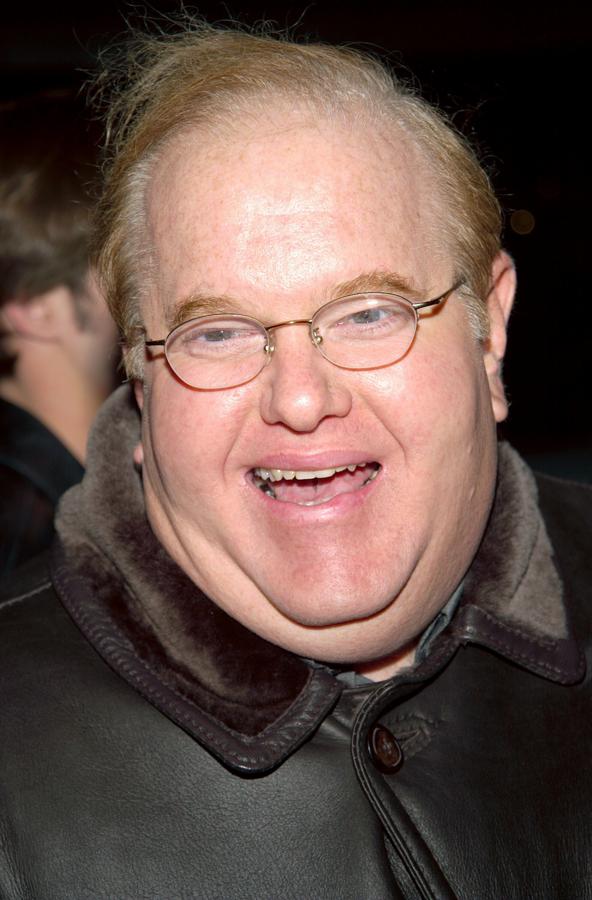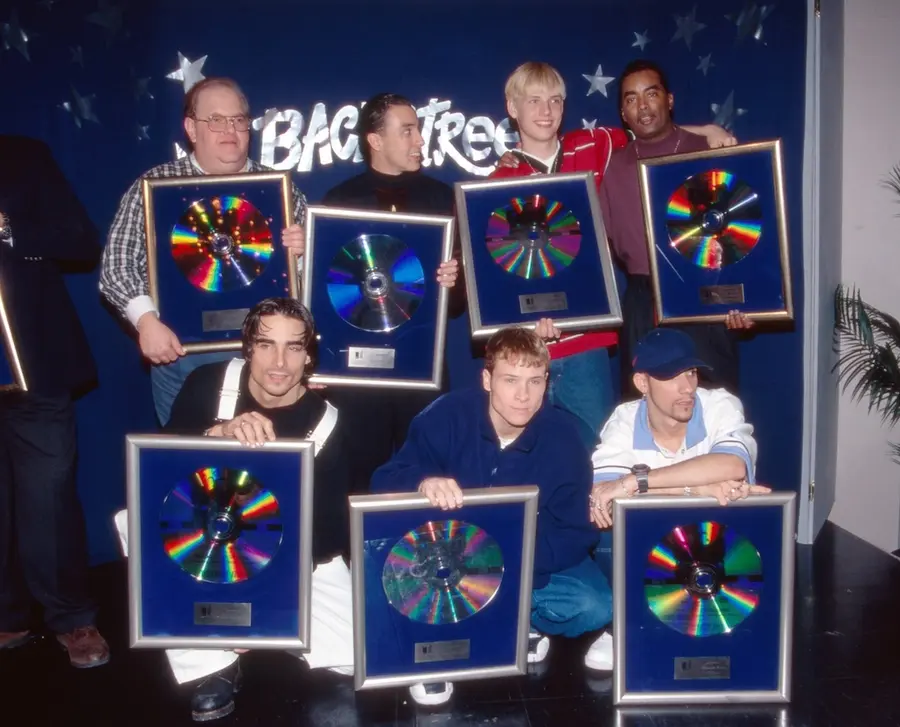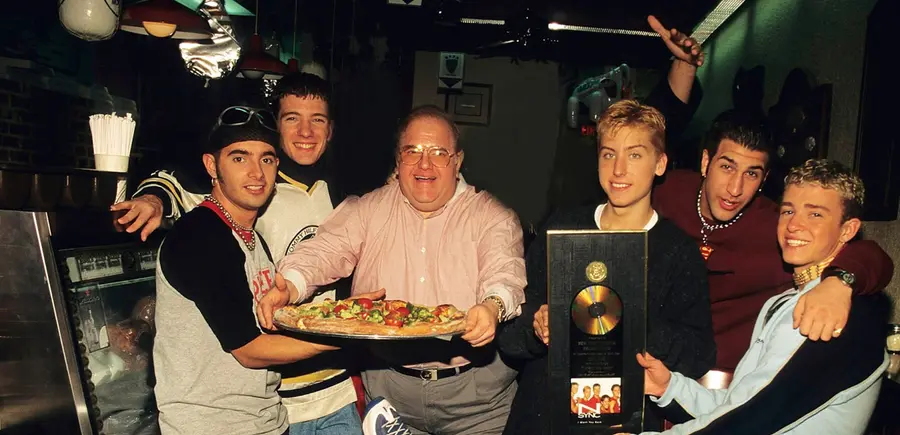Before he was known as the man who created the Backstreet Boys and *NSYNC, Lou Pearlman was just an overweight kid from Queens obsessed with blimps. In the 1980s, he launched a shaky aviation career that soon saw one of his gold-painted Jordache blimps crash into a New Jersey garbage dump. He later raised millions through penny-stock schemes tied to a charter airline that mostly existed on paper.
Pearlman's life changed when he leased one of his planes to one of the biggest musical groups of the 1980s. The boy band, New Kids on the Block. Lou was astonished to learn that a boy band could generate so much money that it needed a private jet to conduct its world tour. From that moment, he decided to build one himself.
That's how the Backstreet Boys were born. Lou immediately doubled down by creating *NSYNC. Just a few years after that New Kids on the Block revelation, Lou had gone from a boring businessman who leased private jets to an exciting music tycoon flying around on private jets. He was hailed as "Big Poppa," the unlikely Svengali who turned Orlando into boy-band central and appeared to be sitting atop a billion-dollar entertainment empire.
That success should have been enough to satisfy (and make obscenely wealthy) any average person. Well, unfortunately, while his groups were reaching the absolute heights of superstardom, generating endless money, Lou was knee-deep in what would turn out to be one of the largest Ponzi schemes in American history.
When the scheme was uncovered, Lou went on the run. He was eventually caught hiding in Bali under the name "Incognito Johnson." Pearlman's story went from pop-music fairy tale to financial horror story. By the time he died in prison in 2016, his net worth was deep in the red, and his once-sparkling empire was a cautionary tale of greed, exploitation, and deceit.

Lou Pearlman – Ponzi Scheme/ Lawrence Lucier/Getty Images
Early Hustles and the Blimp Business
Lou Pearlman grew up in Flushing, Queens, the only child of Hy and Reenie Pearlman. His father ran a small dry-cleaning shop, and his mother worked in a school cafeteria. Lou's first cousin was Art Garfunkel, who would later become famous from Simon & Garfunkel. Lou's father and Art's mother were brother and sister.
Lou was shy, overweight, and often lonely, but he was also fascinated by flight and money-making schemes. As a child, he became obsessed with blimps after spotting a Goodyear airship landing near the 1964 World's Fair. That single moment launched a lifelong fixation with aviation.
While studying accounting at Queens College, Pearlman created a class project outlining a helicopter taxi service in New York City. He soon tried to turn that idea into reality, founding a business called Airship Enterprises in the late 1970s. His first major splash came in 1980 when he secured Jordache Jeans as a sponsor for a promotional blimp. But the gold-painted airship barely made it off the ground before crash-landing in a New Jersey garbage dump, generating humiliating national headlines.
Undeterred, Pearlman regrouped. He incorporated Airship International and, in 1985, took it public, raising millions through penny-stock offerings. He secured clients like MetLife and SeaWorld, leased blimps for corporate promotion, and painted himself as a high-flying aviation entrepreneur. In reality, the company was plagued by crashes, lawsuits, and mounting losses. By the early 1990s, Airship International's stock had cratered from $6 a share to pennies, and the business was effectively dead.
An Airline That Didn't Exist
Even as his blimp ventures collapsed, Lou Pearlman was already laying the groundwork for his most audacious con. In the early 1990s, he claimed to own a thriving charter airline called Trans Continental Airlines, boasting a fleet of dozens of jets and millions in annual revenue. Glossy brochures featured images of planes branded with Trans Con's logo, and Pearlman handed out business cards listing a dizzying array of subsidiaries — from airlines to talent agencies to yogurt shops.
In reality, Trans Con was a mirage. The planes didn't exist, the revenues were fabricated, and even the company's accountants weren't real. Investigators later discovered that the accounting firm "Cohen & Siegel," which had supposedly audited Trans Con's financials, was nothing more than a phone number answered by a secretarial service. When investors or regulators called, they were unknowingly patched straight through to Pearlman himself.
Despite the smoke and mirrors, the scheme worked brilliantly. Pearlman raised millions from small investors and persuaded banks to extend him massive loans, all on the strength of falsified statements. He used staged photos — including images of scale models — to convince people that Trans Con's fleet was real. By the mid-1990s, the airline had become the cornerstone of his empire and the central pillar of what would later be revealed as one of the largest Ponzi schemes in U.S. history.
Building the Backstreet Boys
In the early 1990s, Lou Pearlman's life was forever changed after one of his jets was chartered by New Kids on the Block. Pearlman was floored to learn that a boy band could generate so much money that it could afford a private Boeing for a world tour. If New Kids could gross hundreds of millions from records, touring, and merchandise, why couldn't he build a group of his own?
In 1992, Pearlman placed an ad in the Orlando Sentinel calling for teenage male singers. He auditioned dozens of hopefuls at his Orlando home and later at his blimp hangar in Kissimmee. The final lineup came together when Nick Carter, Kevin Richardson, AJ McLean, Brian Littrell, and Howie Dorough were selected. Pearlman christened them the Backstreet Boys, naming the group after a popular Orlando flea market.
Pearlman invested millions in their development — hiring choreographers, vocal coaches, and seasoned managers Johnny and Donna Wright.
Most importantly, he turned to an up-and-coming Swedish songwriter and producer who had recently begun making a name at Stockholm's Cheiron Studios: Max Martin. One of the first tracks Martin delivered to Pearlman was "Quit Playing Games (With My Heart)." The song became their breakthrough U.S. single in 1997, selling more than 2 million copies and propelling the group into the American mainstream.
From there, Max Martin continued to craft the Backstreet Boys' sound, penning hits like "As Long As You Love Me," "Everybody (Backstreet's Back)," and their signature anthem "I Want It That Way." By the end of the decade, the group's 1999 album "Millennium" had sold more than 30 million copies worldwide. The Backstreet Boys had become the best-selling boy band in history, moving over 130 million albums, performing to sold-out arenas, and dominating pop culture.
For Pearlman, it was the perfect proof of concept. He had built the biggest boy band in the world out of thin air — and he was already preparing to do it again.

Lou with BSB in 1996 (Photo by Fryderyk Gabowicz/picture alliance via Getty Images)
Doubling Down With *NSYNC
Having struck gold with the Backstreet Boys, Lou Pearlman wasted no time replicating the formula. In 1995, he assembled a second boy band designed to compete directly with his own creation. The lineup — Justin Timberlake, JC Chasez, Lance Bass, Joey Fatone, and Chris Kirkpatrick — became ***NSYNC. Like the Backstreet Boys, they were polished, heavily trained, and sent to Europe first to build a fan base before being rolled out in the United States.
Once again, Pearlman turned to the hitmakers at Cheiron Studios in Stockholm. Max Martin and his mentor Denniz Pop had already given the Backstreet Boys their signature sound, and now they supplied *NSYNC with slick, radio-ready singles like "I Want You Back" and "Tearin' Up My Heart." The formula worked perfectly. By the time *NSYNC's debut self-titled album reached America in 1998, the group was already primed for stardom.
The frenzy only grew from there. Their second album, "No Strings Attached," released in 2000, sold a record-breaking 2.4 million copies in its first week — a feat that stood unchallenged for more than 15 years. Powered by singles like "Bye Bye Bye" and "It's Gonna Be Me," *NSYNC sold more than 70 million records worldwide and launched Justin Timberlake into solo superstardom.
For Pearlman, managing both the Backstreet Boys and *NSYNC simultaneously was the ultimate flex. At one point in the late 1990s, the two groups collectively dominated radio, MTV, and the Billboard charts. Pearlman, now nicknamed "Big Poppa," was hailed as the man who had single-handedly created the boy band boom of the 1990s. He would also go on to create the not-quite-as-successful groups O-Town, LFO, and Take 5, among others. On the surface, he looked like a genius. In reality, he was siphoning money from both acts and using their fame to bolster his fraudulent financial empire.

Getty
Exploitative Contracts and Lawsuits
Even at the height of their success, the Backstreet Boys and *NSYNC were already realizing something was wrong. Despite selling millions of albums and packing stadiums, the band members were seeing shockingly little money. Lou Pearlman had structured the contracts so that he not only collected management and production fees, but also paid himself as the so-called "sixth member" of each group.
By 1998, Brian Littrell of the Backstreet Boys had grown frustrated with the band's tiny payouts and launched a lawsuit against Pearlman. His bandmates soon joined, and in the process discovered that Pearlman had siphoned tens of millions from their revenues. *NSYNC followed with its own lawsuit in 1999, leading to a bitter separation and a settlement that freed the group to sign with Jive Records. Aaron Carter, at just 14, also sued Pearlman for racketeering.
In the end, virtually every act Pearlman ever managed — except for a little-known German group called US5 — eventually sued him for fraud or misrepresentation.
$300 Million Ponzi Scheme
The lawsuits only scratched the surface. Behind the music empire was one of the largest and longest-running Ponzi schemes in American history.
But wait. Why would Lou Pearlman, one of the most successful people in the entertainment business, need a Ponzi scheme in the first place? Wasn't he rolling in boy band money? Yes, BUT, his Ponzi scheming had actually begun years before the Backstreet Boys ever sang a note. Even in the late 1980s, while Pearlman was dabbling in blimps and his sham airline business, he was already raising money from investors under false pretenses. His boy bands would later inadvertently become the perfect camouflage for his fraud.
Through shell companies like Trans Continental Airlines and sham investment vehicles he called Employee Investment Savings Accounts (EISA), Pearlman promised investors steady returns of 6–10%, supposedly guaranteed by the FDIC, AIG, or Lloyd's of London. None of it was real. The airlines existed only on paper. The accounting firm "Cohen & Siegel" was nothing more than a mail-drop that redirected calls back to Pearlman. Audited financials were forgeries.
By the time investigators unraveled the scheme, Pearlman had conned nearly 2,000 investors — many of them elderly Florida retirees — out of more than $300 million. On top of that, he had secured over $150 million in fraudulent bank loans with falsified documents.
What the boy bands did provide was credibility. Pearlman leveraged their fame to make his fraud appear legitimate. He would fly investors to Orlando on chartered jets, chauffeur them in limousines, and parade them through studios where the Backstreet Boys or *NSYNC happened to be rehearsing. To outsiders, it looked like proof they were buying into a flourishing entertainment empire. In reality, it was little more than a pyramid scheme fueled by new cash to pay off old obligations.
Flight and Capture
By 2006, regulators had caught on. Florida seized control of some of Pearlman's companies, and lawsuits began piling up from investors and banks. Knowing the game was up, Pearlman fled the country in early 2007. For months, he traveled through Asia and Europe under aliases, including "A. Incognito Johnson."
His luck ran out in June 2007 when a German tourist vacationing in Bali recognized him at a hotel. The tip was passed to the FBI, who arrested Pearlman and flew him back to the United States.
Conviction and Prison
In 2008, Pearlman pleaded guilty to conspiracy, money laundering, and making false statements during bankruptcy proceedings. He was sentenced to 25 years in federal prison and ordered to pay more than $300 million in restitution. A judge even offered to reduce his sentence by one month for every $1 million he repaid, but in practice, almost no money was ever recovered.
Behind bars, Pearlman remained bizarrely optimistic. He started a prison choir, talked about launching a reality show from jail, and claimed he could pay back his victims if only given the chance to form another boy band.
Death and Legacy
Lou Pearlman suffered a stroke in 2010 and later developed a serious heart infection. On August 19, 2016, he died of cardiac arrest following heart surgery at the Federal Correctional Institution in Miami. He was 62.
His legacy remains deeply conflicted. On one hand, he was responsible for launching two of the biggest pop groups in history, acts that defined an era and sold hundreds of millions of records. On the other hand, he defrauded investors, cheated his artists, and left behind unresolved allegations of sexual misconduct. Documentaries like "The Boy Band Con" (2019) and "Netflix's Dirty Pop" (2024) have since revisited his story, painting him as both a dream-maker and a predator.
Lou Pearlman built the biggest boy bands of all time. But when the music stopped, all that was left was a fraud of staggering proportions — and a cautionary tale about greed disguised as genius.
/2023/01/Lou-Pearlman.png)
/2023/03/The-Backstreet-Boys.jpg)
/2014/08/GettyImages-84294097-e1559066156789.jpg)
/2010/11/Brian-Littrell.jpg)
/2010/11/GettyImages-462516962.jpg)
/2017/04/GettyImages-630312450.jpg)
:strip_exif()/2015/09/GettyImages-476575299.jpg)
/2020/02/Angelina-Jolie.png)
/2020/04/Megan-Fox.jpg)
/2020/01/lopez3.jpg)
/2017/02/GettyImages-528215436.jpg)
/2020/06/taylor.png)
/2009/09/Cristiano-Ronaldo.jpg)
/2019/11/GettyImages-1094653148.jpg)
/2009/09/Brad-Pitt.jpg)
/2019/10/denzel-washington-1.jpg)
/2019/04/rr.jpg)
/2018/03/GettyImages-821622848.jpg)
:strip_exif()/2009/09/P-Diddy.jpg)
/2009/11/George-Clooney.jpg)
/2009/09/Jennifer-Aniston.jpg)